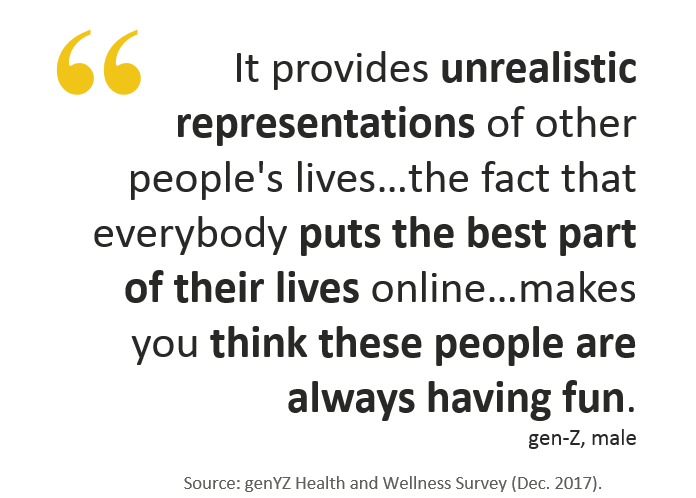It’s Not All Bad. How a Digital Life Really Affects Wellness for Younger Americans
There’s much consternation about the role of smartphones and social media on young people’s lives. From unrealistic beauty standards to the quantification of likes, some have gone so far as to say “smartphones are ruining a generation.” But what’s the real effect of the digital revolution on gen-Z and millennials wellness?
The rise of concepts such as wellness, mindfulness, and self-care have become increasingly prominent in the past few decades. This is particularly true among younger generations – 96% of gen-Z and millennials associate “wellness” with their overall health. Our latest series helps marketers to answer critical questions around wellness as it relates to social media, beauty, and food and beverage preferences.
Here’s well look at three key areas:
- Digital Influence across generations
- Social Comparison in Action
- Implications for Marketers
Digital Influence Across Generations
We frequently hear about teens being more anxious than ever, much of which is attributed to the constant access to smartphones and social media. Despite overwhelming news around digital’s destruction of gen-Z, aka “iGen,” 66% of gen-Z claims social media makes life better. Many teens actually use it to seek support and feel more connected to their friends.
Among the minority of people who believe social media makes life worse, the generational differences as to why are clear. Gen-X and boomer+ reinforce the headlines by claiming younger people have lost the ability to socially interact in-person.
But gen-Z and millennials see the repercussions of social media manifested in negative comparisons, making them feel worse about themselves. This introspective look at how the medium makes them feel is a testament to how they are incorporating mindfulness.
Social Comparison in Action
Younger generations are generally perceived as self-absorbed and narcissistic, which is mostly due to lifestage. However, this notion is reinforced by all the time they spend staring at their phones.
 It’s unsurprising that gen-Z and millennials put more thought into their social profiles, and spend more time thinking about how their peers judge their posts.
It’s unsurprising that gen-Z and millennials put more thought into their social profiles, and spend more time thinking about how their peers judge their posts.
But this makes them acutely aware that social media is not reality. Rather it’s a “highlight reel of people’s lives,” as one gen-Zer put it. They’re hyper aware of inauthentic posts, and are thus wary of inauthentic people. Gen-Z distinctly place importance on interpersonal components in their definition of mindfulness, perhaps as a result of exposure to negative online interactions.
Implications for Marketers
Teenage use of social media is here to stay. But it’s not all bad news, since teens see it as mostly positively impacting their lives. Youthful anxiety should not be overly attributed to this medium.
Social comparison is at the core of social media use for younger people, so connect with them by promoting confidence and healthy interactions. These consumers instantly recognize when posts look forced, so authentically highlight unique aspects of your brand to reach them.
Gen-Z and millennials are mindful of how growing up as technologically savvy generations and social media affects them personally. Don’t focus on generationally biased narratives, rather strive to understand how they experience social media to best engage them.
Please complete the form below to receive additional information from Collage Group.
Stay Informed
Email *:
MARKET RESEARCH
SOLUTIONS
fluen.ci App for Cultural Insights
Consumer Research Data & Tools
RESOURCES
Webinar & Events
ABOUT
Who We Are
Collage Group is a certified Minority Business Enterprise (MBE) by the National Minority Supplier Development Council (NMSDC).
©2023 Collage Group

4550 Montgomery Avenue
Bethesda, Maryland, 20814
(240) 482-8260
Stay Informed
Email *:


Collage Group is a certified Minority Business Enterprise (MBE) by the National Minority Supplier Development Council (NMSDC).
©2023 Collage Group



